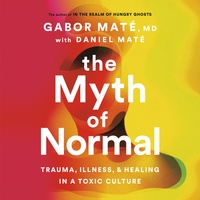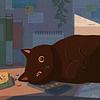Take a photo of a barcode or cover
hopeful
informative
reflective
slow-paced
This book was transformative.
Touching on so many subjects that impact our world that we live in now. Trauma, capitalism, bigotry, sexism, racism..
It included the trauma affecting those in Gaza, the aboriginal community here in Canada and how even now, people still carry generational trauma from the Nazi regime.
It really is a system set to fail (or succeed if you look at it from a economy ran, capitalistic society), set to keep the elite and money hungry at the top while keeping the disenfranchised and underprivileged at the bottom while simultaneously blaming them for their "choices" as opposed to the choices and systems and the society who contribute to their very being.
Gabor Maté shows us how the world impacts us even before we enter the world and how it shapes us into who we become as we grow and end up detached from our true selves. Written by Canadian psychologist and co writer son Daniel Maté who both also touch upon their own trauma and transformation, a book that I think every human being should read.
Touching on so many subjects that impact our world that we live in now. Trauma, capitalism, bigotry, sexism, racism..
It included the trauma affecting those in Gaza, the aboriginal community here in Canada and how even now, people still carry generational trauma from the Nazi regime.
It really is a system set to fail (or succeed if you look at it from a economy ran, capitalistic society), set to keep the elite and money hungry at the top while keeping the disenfranchised and underprivileged at the bottom while simultaneously blaming them for their "choices" as opposed to the choices and systems and the society who contribute to their very being.
Gabor Maté shows us how the world impacts us even before we enter the world and how it shapes us into who we become as we grow and end up detached from our true selves. Written by Canadian psychologist and co writer son Daniel Maté who both also touch upon their own trauma and transformation, a book that I think every human being should read.
emotional
hopeful
informative
inspiring
reflective
medium-paced
As a Psychologist and a thinker, nothing much is new from this book. Now, if you’re not in the field or you haven’t ever questioned deeply and intertwined how our humanity and modern world works, how it affects our health and how life could be better, then this book might bring some light widening your view.
It’s not a light reading, there’s a lot of sensitive topics and the cases commented tend to mention intense trauma.
For the audiobook version in particular, I disliked and would advise to remove and record again the quotes made with “accents”; there’s no need to do that when mentioning a quote from a non-english speaker author.
It’s not a light reading, there’s a lot of sensitive topics and the cases commented tend to mention intense trauma.
For the audiobook version in particular, I disliked and would advise to remove and record again the quotes made with “accents”; there’s no need to do that when mentioning a quote from a non-english speaker author.
informative
slow-paced
informative
medium-paced
This book makes some fairly radical claims about illness and healing, that I think some people may find difficult to accept. For example, the idea that emotional trauma and personality play a role in cancer goes against common sense, yet he makes a strong case for it. He also provides some starting points for addressing emotional issues due to trauma. Most interestingly, these tools do not rely on ever determining what exactly that original trauma was, but rather dealing with the compensatory patterns it has left behind in your personality. There is also discussion of how the medical profession and our culture in general could better address the prevalence of trauma in our lives.
A more accurate title for this book might simply be the subtitle. Do not give it pass if you think "Oh I don't have any trauma." A key point is that no one is normal or trauma free. And even if you disagree with that, it doesn't hurt to develop a better understanding and compassion for others who have had their lives marked by trauma.
A more accurate title for this book might simply be the subtitle. Do not give it pass if you think "Oh I don't have any trauma." A key point is that no one is normal or trauma free. And even if you disagree with that, it doesn't hurt to develop a better understanding and compassion for others who have had their lives marked by trauma.
I'd rate this at exactly 2.5. It had some information that I thought was right on. Information about how phone use has impacted society. How the mind and body are so interdependent.
However there were also some ideas I didn't agree with. For example he dedicates a whole chapter about how women have it worse health wise, but men on average die younger than women so there must be some explanation for that.
I recommend for 14 and up.
However there were also some ideas I didn't agree with. For example he dedicates a whole chapter about how women have it worse health wise, but men on average die younger than women so there must be some explanation for that.
I recommend for 14 and up.
slow-paced
This book is another "shocking that trauma affects the body" with anecdotes and minimal studies. Gabor Mate makes an argument for self compassion with his compassionate inquiry that I thought was a really good exercise. If this book was on my shelf, I'd reread only Chapter 30 for that reason.
Otherwise, I wish there were more studies to support the evidence behind self compassion and perhaps more basic pathophysiology theories rather than purely anecdotal and reflective.
Otherwise, I wish there were more studies to support the evidence behind self compassion and perhaps more basic pathophysiology theories rather than purely anecdotal and reflective.
4.5/5. What a momentous, jumble of a book. Maté doesn't claim to have all the answers to the plethora of modern (and historic) problems people face including racism, sexism, consumerism, trauma, poverty and stress, and how these effect our health - but the conversation is a start. Enjoyed learning about the mind-body connections that indigenous cultures have known for centuries. Although it did make me feel a little hopeless at times, I'm also hopeful that we can work towards a more biopsychosocial approach to medicine in the future.




